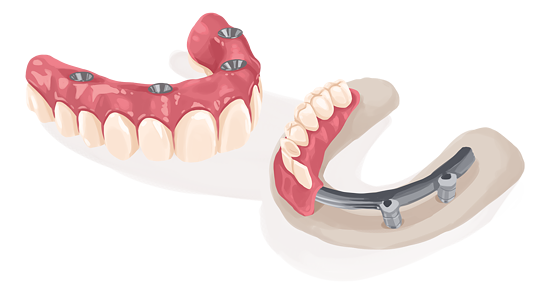Dentures and problems just go together. As good as a set of fake teeth are, they, like anything else, is going to have issues.
So what are the most common denture issues? And how can you deal with them?
In this guide, we’ll learn about the common dentures problems how to solve them, offering insights into prevalent challenges and providing practical solutions to ensure a seamless denture-wearing experience.
What are the most common denture problems?
If you’ve ever experienced one of these common denture problems, you’re not alone. These are the most common issues denture wearers experience.
Dentures slipping
Sometimes you may feel your dentures slipping or shifting. Usually it happens when you smile, laugh, cough, eat, or talk.
A quick fix in the moment of slippage is to bite down (which repositions them) and swallow. We’ll talk about a long-term solution below.
Gums & mouth soreness
If you’re dentures become loose, they can start to rub against the gums or inside or your mouth. This can lead to inflammation, which, if not treated promptly, infection.
To much saliva
Dentures are a new object in your mouth, so it’s completely normal for your mouth to produce more saliva. Eventually, they’ll adjust, but at first you may find you have extra spit hanging around.
Difficulty eating & speaking
If you’re an experienced denture wearer, you probably know that it takes practice to learn how to eat and talk with dentures. Over time, you’ll learn how to hold the dentures in place with the muscles in your mouth.
When it comes to speaking with new dentures, they may feel unnatural and can get in the way of how you’re used to talking.
Also, food can sometimes get stuck under your dentures, which is annoying.
Plus, you may experience less of a taste with food and drinks because your palate is covered by the dentures. Many people don’t realize the palate actually has taste sensors.

Bad breath
If your dentures aren’t sealed properly, food particles and drink residue can get up underneath and sit there. That, if not cleaned in time, leads to bad breath.
Not cleaning your dentures frequently or correctly can lead to bad breath, even if food particles don’t get stuck to them.
Bone loss
Over time, your gums and jawbone deteriorate. So after a while, you may find your dentures no longer fit — this could be because you’ve experienced bone loss.
Jaw joint changes
If your jawbone atrophies, this can affect the jaw joint. And, unfortunately, the jawbone cannot form new bone, so once it’s worn away, it’s gone.
And if your jaw joint changes, that may affect the way your dentures fit your mouth.
How to solve denture problems?
Okay, now onto the solutions to the above problems. These fixes can help solve multiple issues you may be experiencing.
Eat soft food
If you’re experiencing trouble eating, you can try eating softer foods.
Avoid hard or sticky foods — that will just make things more difficult. Taking smaller bites and chewing slower can help as well as using both sides of your mouth when you chew.
The longer you have your dentures, the easier it will get to eat. It’s just a matter of getting use to them.
Use denture adhesive
Using denture adhesive is a great way to hold your dentures in place — most people use it because holding the dentures in with your mouth muscles alone can be too difficult.
This can help solve slippage as well as bad breath because it’s less likely that food particles will get up under the dentures.
Consider denture reline
A denture reline is when your dentist adds to lining to the surface that sits against your gums. They’ll basically reshape your dentures to fit better.
You can get a soft reline or a hard reline. The former uses a liquid polymer that’s layered on the denture to provide a sort of cushion. The latter uses a harder material and is usually a more permanent solution.
Either way, a reline can help with uncomfortable or slipping dentures.

Take care of your dentures
You must have the same level of care for your dentures that you’d have for your natural teeth. But it can be tricky knowing what to do and not do, so here are some tips for taking care of your dentures:
- Don’t sleep with your dentures unless your dentist advises it
- Be careful when you’re handling your dentures — if you drop them, they could break
- Clean your dentures every day soaking them in a denture cleaner overnight, cleaning them every morning before you put them in with a denture brush
- Clean your mouth every day, massaging your gums, the roof of your mouth, and tongue with a soft-bristled brush
- Don’t use toothpicks as those can damage your dentures
Practice pronunciation
Right after you get dentures, it will probably feel weird and be difficult to speak. But just be patient. Try speaking slowly and work on your pronunciation.
It may feel silly at first, but it can be very helpful. It will make you more familiar with how to talk with your new set of teeth.
Choose G4 by Mike Golpa

A much more convenient and permanent option to dentures is the G4 implant solution.
It’s basically the All-On-4 procedure but better and more long-lasting. Dr. Golpa and the team have performed over 5,000 of this special G4 procedure, so we’ve honed it until it’s the best it possibly can be.
For more info, contact us to see if you might be a candidate.
